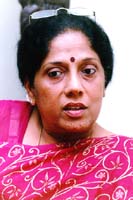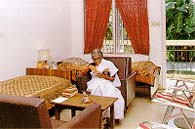The Rediff Interview / Sivasankari
'Any seed will be truthful to the soil in which it is planted'
 From where do you take your characters? Is it from your
surroundings alone?
From where do you take your characters? Is it from your
surroundings alone?
Yes, of course, from those I meet and see. I don't like to make
the identity quite obvious, at the same time I would like them
to have shapes so that many people would identify (with the characters).
It is a story
after all, You have to make them interesting. Giving a message
alone is a primary function. The message has to go indirectly,
sugar-coated so that it tastes very good.
Do you mean a creative writer has to give a message in each
story?
You can call it by different names. Certainly not preaching,
certainly not educative but information and message are the same.
I give it to you as truthful, authentic information. If you take
it as a message, it is because of your need. But I give positive
information -- whether it is on drugs, adultery, hormones,
alcoholism, or a working women's problems. I do spadework and
I reflect as truthfully as possible, making it interesting with
some fictional aspect.
You have written so much about drugs. A television serial was made
based on your novel. You may have met many youngsters who are
drug addicts. From your experience, will you tell us what
drives these youngsters to drugs?
The drug history is a fairly new phenomenon, it happened
some thirty years ago. In fact, in some areas in Rajasthan, people
offer opium like they offer haldi kumkum to guests. Even in America,
to my knowledge, drug abuse became a major problem only in the
sixties.
 In the sixties and the seventies, India was just a trafficking
country. From the golden crescent and the golden triangle which
lay on either side of India, opium was brought to India and it
was converted into heroin here and later on was sent to the western
countries. Then the western states brought in stringent laws to
control this smuggling. So, a lot of those drugs began accumulating
in India. Naturally the drug traffickers saw big potential
here itself.
In the sixties and the seventies, India was just a trafficking
country. From the golden crescent and the golden triangle which
lay on either side of India, opium was brought to India and it
was converted into heroin here and later on was sent to the western
countries. Then the western states brought in stringent laws to
control this smuggling. So, a lot of those drugs began accumulating
in India. Naturally the drug traffickers saw big potential
here itself.
By the mid-seventies, India became a user's paradise
from a trafficking country. India being a poor country, they could
not sell heroin for 400 rupees per gram. What they did was, they
mixed one portion of heroin with dhatura seed powder, which is
highly poisonous, and zinc oxide and marketed it. So the white
heroin became brown and came to be known as brown sugar in India.
When I was doing my research in the late seventies, it was sold
for just forty rupees.
By the early eighties, college students got exposed to it
and they got such a kick out of it too! When I came to know from
doctors that with just one usage, even by inhaling, people got
addicted to it, I thought it was my duty to inform the public
about it.
I wrote the story Avan in 1985 with four youngsters
from different family backgrounds as heroes. One boy was from
a shattered family, another had to shoulder the responsibility
of the family as his father was not alive. The third one had everything
and the fourth had a normal, healthy, disciplined family. I wanted
to tell people that anybody can be a victim to drugs.
I was told by doctors that it was curiosity that drove youngsters
to drugs. They also think they get pleasure out of it. Peer pressure
also plays a major and dangerous role. These days most of the
children come back to an empty home and they feel neglected. Now
parents rather sit in front of the television and watch a programme
than ask the child about his school day. How many parents have
the time for it now? The youngest drug addict I met was an eight
year old!
How did society react to your findings, your novel?
I received a lot of brickbats. But I was not bothered. They said I was giving unnecessary
information to youngsters
about western culture and their habits. They are very wrong. Just
because some people are not exposed to such problems, they cannot
say that such a problem does not exist at all. It was very saddening
to see a drug addict. The rehabilitation success rate is just
five per cent.
Do you feel the parents of those youngsters
are responsible for driving them to drugs? How can the parents
help them recover?
Times have changed. Parents should start treating their children
as friends and parents should stop comparing children. The tension
and stress that today's child goes through is tremendous. You
should not push your dreams into your child's reality. It might
have happened some thirty years ago, but society has changed now.
A child should have the confidence to reveal his problems to his
parents.
Why do today's parents push their children very hard?
 If there are ten seats for a course, there are a thousand people
applying for it. So, it has become a world of competition.
If there are ten seats for a course, there are a thousand people
applying for it. So, it has become a world of competition.
You have traveled a lot, you told me, You have written stories
about Indians abroad. It is said that
Indian elders there try to impose Indian culture on their children,
but the youngsters, who are brought up in a different social atmosphere,
do not relate to the elders's idea and naturally it leads
to clashes. Have you observed anything like that at close quarters?
My last novel was Ini (Hereafter). I went to the US for the
first time in 1970. The seed for a novel was sown in me then itself.
I watched with interest the Indians who have migrated there in
the sixties. Their problems start when their children become teenagers.
Many of the parents could not accept dating and things that are
part of that culture. I am not talking about the US alone, it
is there everywhere.
I wrote a novel based on the theme 25 years later. One thing the elders should remember -- For them
their home might be India, for their children home is the country
they grew up in. While the parent's roots remain in India, the children have their roots in the country
they grew up in. Parents should accept this fact. Any seed will
be truthful to the soil in which it is planted. I feel the problem
is only for the first generation who have migrated. The second
generation becomes natural citizens of the country they are in.
This applies to those who have migrated from the villages to towns
even in India.
Photographs: Sanjay Ghosh
|





 From where do you take your characters? Is it from your
surroundings alone?
From where do you take your characters? Is it from your
surroundings alone?
 In the sixties and the seventies, India was just a trafficking
country. From the golden crescent and the golden triangle which
lay on either side of India, opium was brought to India and it
was converted into heroin here and later on was sent to the western
countries. Then the western states brought in stringent laws to
control this smuggling. So, a lot of those drugs began accumulating
in India. Naturally the drug traffickers saw big potential
here itself.
In the sixties and the seventies, India was just a trafficking
country. From the golden crescent and the golden triangle which
lay on either side of India, opium was brought to India and it
was converted into heroin here and later on was sent to the western
countries. Then the western states brought in stringent laws to
control this smuggling. So, a lot of those drugs began accumulating
in India. Naturally the drug traffickers saw big potential
here itself.
 If there are ten seats for a course, there are a thousand people
applying for it. So, it has become a world of competition.
If there are ten seats for a course, there are a thousand people
applying for it. So, it has become a world of competition.